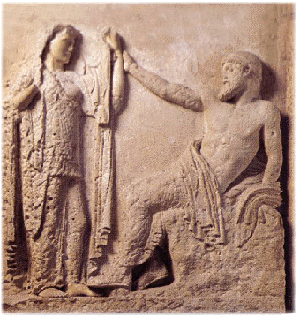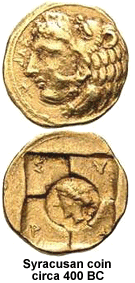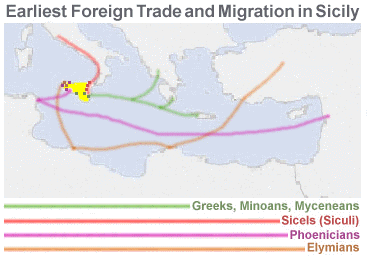...Best of Sicily presents... Best of Sicily Magazine. ... Dedicated to Sicilian art, culture, history, people, places and all things Sicilian. |
by Vincenzo Salerno | |||||
Magazine Index Best of Sicily Arts & Culture Fashion Food & Wine History & Society About Us Travel Faqs Contact Map of Sicily
|
Greek society was influenced by the cultures of the eastern Mediterranean (particularly the Assyrians, Babylonians and Egyptians). In turn, Greek culture evolved and influenced ancient Roman society - at least as much so as the Etruscans. Greek art and philosophy, the foundation upon which much of Roman culture was built, came to dominate the Mediterranean world for centuries, eclipsed by Christian movements in the age of the Roman Empire. To some extent, Greek culture merged with the cultures of Persia, Phoenicia and then Rome, but it also represented a unique phenemonon in its own right. The Greek language, whose alphabet was based on Phoenician, was the vernacular
tongue of Sicily well into the early Middle Ages. Under Many of the greatest Greek myths, and some of the greatest Greek temples and amphitheatres, are Sicilian. Within a few centuries of its foundation, the Sicilian city of Syracuse (Siracusa), the birthplace of Archimedes, came to rival Athens in power and prestige. Beyond the islets of the Aegean Sea, Greek influence enveloped the islands of Cyprus and Crete, and kissed the shores of coastal Ukraine (Crimea), France and Spain. In its final days, even Egypt's empire fell under the Hellenistic aegis; Cleopatra was the last heiress of a Greek dynasty. Greece holds a special place among the ancient civilizations to shape Europe, north Africa and Mediterranean Asia --the "Western World." Only the Romans were more culturally influential, and classical historians often speak of "Greco-Roman" culture almost as though Greece and Rome were "twins." Roman ruins are not lacking in Sicily, but anybody seeking an exclusively "Latin" heritage comparable to that of Milan, Turin or Benevento will be disappointed; the patrimony of Greek Sicily is at least as apparent as that of Roman Sicily. Evidence indicates a Mycenean and Minoan presence in certain parts of Sicily, particularly ports along the Ionian coast, before 1400 BC, possibly for trade. The only "native" Sicilian peoples known with certainty to be present at that time were the Sicanians, whose society was quite primitive compared to that of the Greeks. Wars and famine at home prompted emigration, and it was also presumed that more land was available in Italy than in Greece. The Ionians were the first Greeks to establish a permanent presence in Sicily, where they encountered an Italic society, the Sicels, hence the Greeks' name for the island, Sikelia. A group arrived to found Naxos (near Taormina) around 735 BC. This is believed to be the first permanent Greek settlement in Sicily. What followed was a rapid colonization on a large scale. Syracuse (Siracusa) was founded a few years afterward by colonists from
Corinth. The foundation of Zancle (Messina) followed about the same time.
Near both these localities were earlier ports --in some form-- already known
to Greek navigators. A number of other colonies sprung up along the Ionian
coast about this time, Megara (or Megara Hyblaea, near Augusta) prominent
among these: this settlement was established in 728 BC by immigrants from
Megara in Greece. Katane (Catania) was settled around the same time. Colonists
from Rhodes and Crete founded Gela during the same period. Selinus (Selinunte)
was founded in the following century. Akragas (Agrigento) is a younger city,
established around 580 BC by citizens of Gela. The Elymian city of Egesta
(Segesta) was gradually Hellenized during this same general period. A number
of communities that had flourished under the Sicanians, Elymians or Sicels
were assimilated by the Greeks in successive centuries. Eventually, there
was some resistance from the Sicels. (Ancient historians It is easier to understand the history of Greek Sicily if one knows something of ancient Greece itself. The Hellenes (Greeks) of Hellas (Greece) lived in independently-governed city-states but shared a common language and religion. Greek civilization could be said to have developed beginning around 2000 BC. As early as 3000 BC, the Minoans (of Crete) dominated Aegean society. The Mycenaeans (of the southern part of mainland Greece) supplanted them around 1450 BC, and established outposts in eastern Sicily. For reasons which are not entirely clear, Mycenae and some other localities of the Peloponnesus were destroyed some time after 1200 BC, and the Dorians of northern Greece occupied the region while many Mycenaeans fled to Asia Minor (modern Turkey). Thus began a Dark Age that lasted until about 800 BC. This is when many Greeks emigrated, settling in Sicily (as well as other Mediterranean areas and along the Black Sea. Around 800 BC writing again became widespread, this time using an alphabet influenced by Phoenician. Tyrants (so-called because they took power by force) ruled many city-states, including those in Sicily, but there were occasional periods of genuine democracy, a principle introduced to the world by the Greeks. Despite democratic ideas and sophisticated philosophy, Greeks were generally disdainful of non-Greeks, called "barbarians" because they often wore beards. Though the Romans used similar terms, they were more open to granting citizenship to foreigners. In the years before 500 BC, Persia seized Greek city-states in Asia Minor and rebellion followed. The Athenians defeated the Persian army at Marathon in 490 BC. Ten years later, the Persian navy, supported by Phoenicians, was defeated at the Bay of Salamis. In Sicily, the role of the Phoenicians in the "Persian War" did not endear the Greek settlers to the Carthaginians (Phoenician descendants), and this aggravated an already tense rapport. The defeat of Carthaginian forces at Himera in 480 BC reflected this antipathy. A Golden Age followed the defeat of the Persians, but a rivalry worsened between northern and southern Greeks. This Peloponnesian War between Athens and Sparta began in 431 BC and peace was completely restored only in 404 BC. In 416 BC, the conflict between Athens and Syracuse led to war, and an Athenian expedition to the Sicilian city. The Syracusans were saved by the Spartans. The Athenians' defeat effectively ended the power of Athens and other Greek city-states over the Sicilian cities, but the conflict with Carthage continued. In 409 BC, Carthaginians attacked and destroyed Himera and Selinus. By 338 BC, following a series of battles, the Greek city-states were conquered by the Macedonians. Alexander the Great established an empire ranging from Greece to Persia (modern Iran). Following his death, a "Hellenistic Age" flourished and Greek culture influenced the lands Alexander had conquered. While Greece was influenced to some degree by these regions to the east, the greatest cultural influence --even over the conquering Macedonians-- was that of Greek culture. Syracuse, Sicily's greatest Greek city, fell to the Romans in 212 BC. In 146 BC, the Romans' third "Punic War" against Carthage brought an end to several centuries of Phoenician (and then Carthaginian) conflict against the Greeks and subsequently the Romans. By 140 BC, the Romans had annexed Greece to their rapidly-expanding Empire. Again, however, Hellenic culture was to influence the conquerors. It is not an understatement to say that ancient Greece, despite its polytheism (in mythology) and slavery, was the cornerstone of Western civilization. Government by the people (democracy), trial by jury and (eventually) equality under the law were guiding principles in Greece and its colonies. The Greeks set the pace in many fields based on scientific thought or reasoning. Mathematics, geometry, physics, philosophy and biology owe much to the knowledge of the ancient Greeks. In literature, they developed tragedy, comedy and lyric poetry. Their ideal of aesthetics and beauty greatly influenced Western art. All of this could be seen in Sikelia. Plato, who visited Syracuse in 388, considered Sicily the perfect setting for his Utopian society. City life (including urban design), government and citizenship were based on concepts known in Athens and Corinth. Ideally, the indigenous peoples who assimilated with the Greeks should have become Hellenized in every effect, though the process met with more success in some times and places than in others. External relations (such as those with the Carthaginians) were also complex at times. Following the first few centuries of colonization, most Greek cities in Sicily were independent for much of their history; this allowed Selinus and Akragas to trade with Carthage even while most Greek cities were officially at war with the African city, while Zancle blocked the Strait of Messina and required that Greek ships pay harbor taxes. Utopia was but a dream. Greek society was hardly perfect, and social problems were spawned by inequality. Yet, a certain prosperity reigned. In antiquity, Sicily offered traders timber, wool and grain in exchange for ceramic products, woven fabrics and metals. The Sicily of the ancient Greeks was much more extensively forested than the island we know today, with flowing (and navigable) rivers rather than seasonal run-off streams. Classical Greek art and architecture complemented this environment. Homer's Odyssey offers the best-known literary description of Sicily.
Diodorus Siculus and Thucydides Greek culture did not end with the Roman Empire, though it evolved in the Christian era. The Byzantines ("Byzantine Greeks") are identified with the "residual" Greek civilization of Byzantium (later Constantinople and now Istanbul) which flourished as the capital of the Eastern Roman Empire, continuing as a centre of culture in the Early Middle Ages. The Romans certainly influenced Sicily, but they did not establish new settlements so much as "Romanize" existing Greek ones. An influx of Romans occurred over the course of centuries, spawning a kind of "Greco-Roman" society which never seems to have become overwhelmingly Italic. Among Sicily's ancient peoples, the Greeks left the greatest genetic and historic patrimony. Until the mass settlement of hundreds of towns by the Saracens (Arabs) in the Middle Ages, Sicily's ancient and medieval (Byzantine) Greek heritage constituted the most prominent aspect of the island's culture. About the Author: Palermo native Vincenzo Salerno has written biographies of several famous Sicilians, including Frederick II and Giuseppe di Lampedusa. | ||||
Top of Page |
 Beginning around 800 BC (BCE), following several centuries of sporadic contact
with Sicily's smaller islands and coastal areas, the Greeks began what
is now considered the first mass colonization of Sicily and southern peninsular
Italy. As Magna Graecia (Megara Hellas), this region eventually became home
to more Greeks than Greece itself. Within a few centuries, the Greeks completely
assimilated the native
Beginning around 800 BC (BCE), following several centuries of sporadic contact
with Sicily's smaller islands and coastal areas, the Greeks began what
is now considered the first mass colonization of Sicily and southern peninsular
Italy. As Magna Graecia (Megara Hellas), this region eventually became home
to more Greeks than Greece itself. Within a few centuries, the Greeks completely
assimilated the native  the Romans, Latin
became the "official" language of Sicily, but most Sicilians continued
to speak Greek, which was also spoken by most educated Romans. The contributions
of the Phoenicians and Carthaginians should not be overlooked, but these
were relatively short-lived and largely restricted to western Sicily. Moving
from east to west, the Greeks eventually colonised the entire island. Their
rapid amalgamation with the Elymians of northwestern Sicily was accomplished
so rapidly and so completely that archeologists cannot always distinguish
one civilization from the other.
the Romans, Latin
became the "official" language of Sicily, but most Sicilians continued
to speak Greek, which was also spoken by most educated Romans. The contributions
of the Phoenicians and Carthaginians should not be overlooked, but these
were relatively short-lived and largely restricted to western Sicily. Moving
from east to west, the Greeks eventually colonised the entire island. Their
rapid amalgamation with the Elymians of northwestern Sicily was accomplished
so rapidly and so completely that archeologists cannot always distinguish
one civilization from the other. are the primary
source for the precise dates mentioned here.)
are the primary
source for the precise dates mentioned here.) are its best-known
Greek historians, with the work of the latter considered more factual. Sicily
was home to
are its best-known
Greek historians, with the work of the latter considered more factual. Sicily
was home to